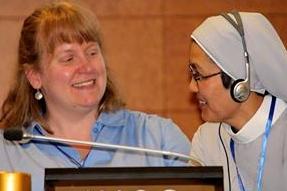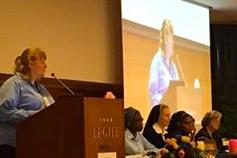I entered my congregation just seven years ago, at age 30. I never dreamed of becoming a sister, but after completing a doctoral program in theology, I began to feel myself pulled in that direction. My story is unique, like everyone else’s, but the stories of younger sisters share some common elements. In the United States (and I suspect, elsewhere), many younger sisters come to religious life after being on their own and starting a career. Many of us did not know many (or even any) Sisters growing up. I knew two sisters who taught in my graduate school, but most of the religious I knew were men. Our culture has changed so much since the highest numbers of women religious entered congregations in the 1950s that it’s hard to fathom how the stories of different generations differ.
Yet we all come with the desire for something more, and we all come knowing God has called us to be sisters and to live in a particular way. Most of the young sisters I know are drawn to community living, to common prayer, and many are on fire for social justice. It is this common core reality that gives me hope for the future: God calls us, and we answer with all our hearts. Though our numbers are decreasing, we are here, called by God to love and serve God’s people.
When I was asked to speak as part of this panel, the topic of “global solidarity” and hope for the future of religious life spoke to me first of the areas where I have found companionship in religious life, both in my own congregation and among members of other religoius orders. A second area where I find hope is in the nimble-ness or flexibility of smaller numbers, and in the freedom that comes from reducing our sponsorship of large institutions. And, finally, Pope Francis offers me a vision of what religious life should always be: a joyful and prophetic witness to the Spirit of God in the world. I will speak to each of these areas separately: companionship and collaboration; the flexibility of smaller congregations; and the vision of Pope Francis for religious life.
First, I find hope, excitement, and support in my companions on this journey. Because there was a gap between me and the last sister who entered before me, many of my peer relationships have come from other religious orders. One source of those friendships is Giving Voice, an organization of younger women religious (under age 50) from a variety of apostolic congregations. Giving Voice began in the 1990s, from the grassroots, when younger sisters started to realize they needed a forum to share their thoughts on religious life. One of the difficulties of having fewer younger voices is that sometimes it feels like our voices are drowned out by the voices of our older sisters, which are so much more numerous. So a few sisters got together to share their experiences, and Giving Voice grew out of their gatherings.
Being part of Giving Voice has led me to some of my closest friendships in religious life, with women near my age who have had similar experiences of formation and intergenerational living. As a whole, Giving Voice represents the great diversity among young U.S. Catholics and sisters, including some sisters from Canada and Latin America. Though different, we are united in our common desire to live as God calls each of us and to minister in a way that contributes to the Kingdom of God, for which we long. We recognize in one another a common call, and yet we each hold our own charism so lovingly that we are able to value the charisms of one another as each contributes uniquely to the common whole.
In this context of young women religious, we collaborate and develop leadership skills together. On several occasions, I have worked with other sisters to design a retreat weekend. I am currently in the process of working with a Franciscan sister to bring together 14 women of different congregations, ethnicities, and visions of religious life to collaborate on a book. Together, and with the financial support of the Conrad N. Hilton Foundation, we will explore contemporary language for the life of apostolic women religious.
In addition to the companionship of Giving Voice, I find hope in collaboration with other religious men and women and lay ministers. In my current ministry, I, a Sacred Heart sister, minister at a theology school run by Dominican friars, where the other faculty members, both men and women, are religious, diocesan clergy, and lay. Our students reflect the same diversity, united in the desire to serve the church. I have learned to adopt a Sacred Heart form of Dominican spirituality in order to teach here! This collaboration among charisms helps me understand who I am as a Religious of the Sacred Heart while at the same time offering opportunities to express Dominican gifts. I find myself combining the Sacred Heart focus on personal relationships with the Dominican view of contemplative study in the search for truth.
A second area where I find hope for the future of religious life is in the flexibility of smaller numbers and increasing detachment from large institutions. This is perhaps the hardest reality to articulate, because it is a hope mixed with deep sadness and grief. We are increasingly free of our institutions, which is both painful for the membership and also frees us from a material and financial burden that is no longer sustainable. In religious life, we are aging rapidly, the sisters who are vibrantly living in their 70s will all be retired. As our numbers decrease, I believe we will become more nimble, more able to let go of some of the properties that hold us and the institutions we can no longer staff. It will encourage us to seek out the gifts of the laity and of sisters of other congregations even more than we already do. It will mean we grieve a lot over the next years, as the sisters we love make their way to God’s home. We need to take care of one another in this grief, especially our younger members who may not have the internal resources to face a level of grief that is not common among their lay peers.
This smaller size will mean we have to make deliberate decisions to live in community, and to come together in particular ways. I have such mixed feelings about this rapidly changing picture, as the “bubble” of sisters who entered in the 1950s and 60s comes to and beyond retirement age (even sister- retirement age!). We have the gift of their wisdom and the enthusiasm of their call to religious life. We benefit from the changes they lived through that enabled religious life to look different for a modern world. And as they leave us behind, we have the opportunity to stand on our own feet, supported by our traditions and our saints in heaven, engaging and shifting in the world as it constantly changes around us. I have no idea what the future will look like, but I have great hope that we will be both flexible enough and grounded enough in our tradition to answer the calls of the world faithfully.
Finally, I find hope in the person of Pope Francis. He calls us to be joyful, to be on the peripheries, to be prophetic in how we live. This is the present and the future of religious life. Our world desperately needs the prophetic witness that religious life offers. As our world holds onto individualism, we live in communities of deep abiding connection. As the world around us succumbs to the commercialism that promotes unprecedented levels of consumption, we commit ourselves to voluntary poverty in solidarity with those who are genuinely poor. In a world that fears commitment and permanence, we make vows to God that place us in perpetual relationship with one another. As our world ignores the needs of people who are poor and of our environment in order to cater to the wealthy and powerful, we witness and advocate for a just relationship with the earth and with all peoples who live on it. Our world is increasingly secular, and we offer a different way of being—we are out in the world, in touch with its needs, and yet also we share our faith in Jesus Christ and a deep relationship with God. We have something the world craves right now: purpose, connection, and unconditional love. While others may only feel emptiness, we offer depth of meaning and a life of integrity.
I do not see a crisis in vocations to religious life, and I don’t view smaller numbers as a “problem.” Yes, there are fewer women coming in our doors, but at the same time, we are here. We have chosen a path that is different from most of our peers, and we come to our congregations ready to pray together, to work hard and to minister in challenging situations. I admire the women who stand beside me in religious life today, and I love being able to collaborate with them in ministry, prayer, and conversation. The present is the future! We are here—and we witness to the love that God has for the world.
Juliet Mousseau rscj


